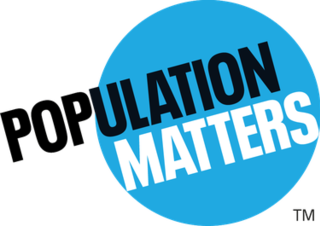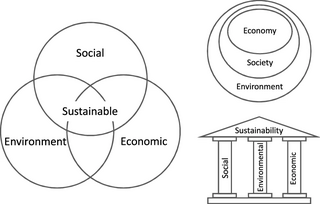Related Research Articles
Sustainable development is an approach to growth and human development that aims to meet the needs of the present without compromising the ability of future generations to meet their own needs. The aim is to have a society where living conditions and resources meet human needs without undermining planetary integrity. Sustainable development aims to balance the needs of the economy, environment, and social well-being. The Brundtland Report in 1987 helped to make the concept of sustainable development better known.
The Worldwatch Institute was a globally focused environmental research organization based in Washington, D.C., founded by Lester R. Brown. Worldwatch was named as one of the top ten sustainable development research organizations by Globescan Survey of Sustainability Experts.
Overconsumption describes a situation where a consumer overuses their available goods and services to where they can't, or don't want to, replenish or reuse them. In microeconomics, this may be described as the point where the marginal cost of a consumer is greater than their marginal utility. The term overconsumption is quite controversial in use and does not necessarily have a single unifying definition. When used to refer to natural resources to the point where the environment is negatively affected, it is synonymous with the term overexploitation. However, when used in the broader economic sense, overconsumption can refer to all types of goods and services, including manmade ones, e.g. "the overconsumption of alcohol can lead to alcohol poisoning". Overconsumption is driven by several factors of the current global economy, including forces like consumerism, planned obsolescence, economic materialism, and other unsustainable business models and can be contrasted with sustainable consumption.
The ecological footprint measures human demand on natural capital, i.e. the quantity of nature it takes to support people and their economies. It tracks human demand on nature through an ecological accounting system. The accounts contrast the biologically productive area people use to satisfy their consumption to the biologically productive area available within a region, nation, or the world (biocapacity). Biocapacity is the productive area that can regenerate what people demand from nature. Therefore, the metric is a measure of human impact on the environment. As Ecological Footprint accounts measure to what extent human activities operate within the means of our planet, they are a central metric for sustainability.

Paul Ralph Ehrlich is an American biologist known for his predictions and warnings about the consequences of population growth, including famine and resource depletion. Ehrlich is the Bing Professor Emeritus of Population Studies of the Department of Biology of Stanford University.

Jeremy Rifkin is an American economic and social theorist, writer, public speaker, political advisor, and activist. Rifkin is the author of 23 books about the influence of scientific and technological changes on the economy, the workforce, society, and the environment. His most recent books include The Age of Resilience (2022), The Green New Deal (2019), The Zero Marginal Cost Society (2014), The Third Industrial Revolution (2011), The Empathic Civilization (2010), and The European Dream (2004).
Eco-capitalism, also known as environmental capitalism or (sometimes) green capitalism, is the view that capital exists in nature as "natural capital" on which all wealth depends. Therefore, governments should use market-based policy-instruments to resolve environmental problems.
Anne Howland Ehrlich is an American scientist and author who is best known for the predictions she made as a co-author of The Population Bomb with her colleague and husband, Paul R. Ehrlich. She has written or co-written more than thirty books on overpopulation and ecology, including The Stork and the Plow (1995), with Gretchen Daily, and The Dominant Animal: Human Evolution and the Environment (2008), among many other works. She also has written extensively on issues of public concern such as population control, environmental protection, and environmental consequences of nuclear war.

Lester Russel Brown is an American environmental analyst, founder of the Worldwatch Institute, and founder and former president of the Earth Policy Institute, a nonprofit research organization based in Washington, D.C. BBC Radio commentator Peter Day referred to him as "one of the great pioneer environmentalists."

The Environmental Performance Index (EPI) is a method of quantifying and numerically marking the environmental performance of a state's policies. This index was developed from the Pilot Environmental Performance Index, first published in 2002, and designed to supplement the environmental targets set forth in the United Nations Millennium Development Goals.
Human overpopulation is the idea that human populations may become too large to be sustained by their environment or resources in the long term. The topic is usually discussed in the context of world population, though it may concern individual nations, regions, and cities.
Environmental indicators are simple measures that tell us what is happening in the environment. Since the environment is very complex, indicators provide a more practical and economical way to track the state of the environment than if we attempted to record every possible variable in the environment. For example, concentrations of ozone depleting substances (ODS) in the atmosphere, tracked over time, is a good indicator with respect to the environmental issue of stratospheric ozone depletion.

Population Matters, formerly known as the Optimum Population Trust, is a UK-based charity that addresses population size and its effects on environmental sustainability. It considers population growth as a major contributor to environmental degradation, biodiversity loss, resource depletion and climate change. The group promotes ethical, choice-based solutions through lobbying, campaigning and awareness-raising.
Bright green environmentalism is an environmental philosophy and movement that emphasizes the use of advanced technology, social innovation, eco-innovation, and sustainable design to address environmental challenges. This approach contrasts with more traditional forms of environmentalism that may advocate for reduced consumption or a return to simpler lifestyles.
The Yale Center for Environmental Law & Policy is a joint initiative between the Yale School of Forestry & Environmental Studies and the Yale Law School.
Sustainability metrics and indices are measures of sustainability, using numbers to quantify environmental, social and economic aspects of the world. There are multiple perspectives on how to measure sustainability as there is no universal standard. Intead, different disciplines and international organizations have offered measures or indicators of how to measure the concept.
Sustainability science first emerged in the 1980s and has become a new academic discipline. Similar to agricultural science or health science, it is an applied science defined by the practical problems it addresses. Sustainability science focuses on issues relating to sustainability and sustainable development as core parts of its subject matter. It is "defined by the problems it addresses rather than by the disciplines it employs" and "serves the need for advancing both knowledge and action by creating a dynamic bridge between the two".

Sustainability is a social goal for people to co-exist on Earth over a long period of time. Definitions of this term are disputed and have varied with literature, context, and time. Sustainability usually has three dimensions : environmental, economic, and social. Many definitions emphasize the environmental dimension. This can include addressing key environmental problems, including climate change and biodiversity loss. The idea of sustainability can guide decisions at the global, national, organizational, and individual levels. A related concept is that of sustainable development, and the terms are often used to mean the same thing. UNESCO distinguishes the two like this: "Sustainability is often thought of as a long-term goal, while sustainable development refers to the many processes and pathways to achieve it."
A sustainability organization is (1) an organized group of people that aims to advance sustainability and/or (2) those actions of organizing something sustainably. Unlike many business organizations, sustainability organizations are not limited to implementing sustainability strategies which provide them with economic and cultural benefits attained through environmental responsibility. For sustainability organizations, sustainability can also be an end in itself without further justifications.

In economic and environmental fields, decoupling refers to an economy that would be able to grow without corresponding increases in environmental pressure. In many economies, increasing production (GDP) raises pressure on the environment. An economy that would be able to sustain economic growth while reducing the amount of resources such as water or fossil fuels used and delink environmental deterioration at the same time would be said to be decoupled. Environmental pressure is often measured using emissions of pollutants, and decoupling is often measured by the emission intensity of economic output.
References
- ↑ "Environmental, Business Leaders Support Call for 100% U.S. Green Grid by 2020." PR Newswire, September 13, 2010.
- ↑ Mouwad, Jad. "Carbon Emissions See Big Two-Year Drop," New York Times Green Inc. Blog, October 19, 2009.
- ↑ "EPI Releases - Au Revoir & Thank You! | EPI".
- ↑ EPI e-mail listserv Archived 2009-08-10 at the Wayback Machine
- ↑ Earth Policy Institute: Translations, Accessed September 21, 2010.
- ↑ Earth Policy Institute. accessed 6 July 2015.
- ↑ Earth Policy Institute. accessed 6 July 2015.
- ↑ Earth Policy Institute." accessed 6 July 2015.
- ↑ Earth Policy Institute." accessed 6 July 2015.
- ↑ Plan B Updates, Accessed September 21, 2010.
- ↑ Lean, Geoffrey. "Britain needs to get on its bike," Telegraph.co.uk, October 2, 2010.
- ↑ Eco-Economy Indicators, accessed September 21, 2010.
- ↑ Sustainablog Author: Earth Policy Institute. http://blog.sustainablog.org/author/earthpolicy/ Accessed September 21, 2010.
- ↑ Earth Policy's Sharebook.http://www.care2.com/c2c/share/sharebook/576038753&tag=brown Accessed September 21, 2010.
- 1 2 "Au Revoir & Thank You!". Earth Policy Institute. June 29, 2015. Retrieved 2015-06-29.